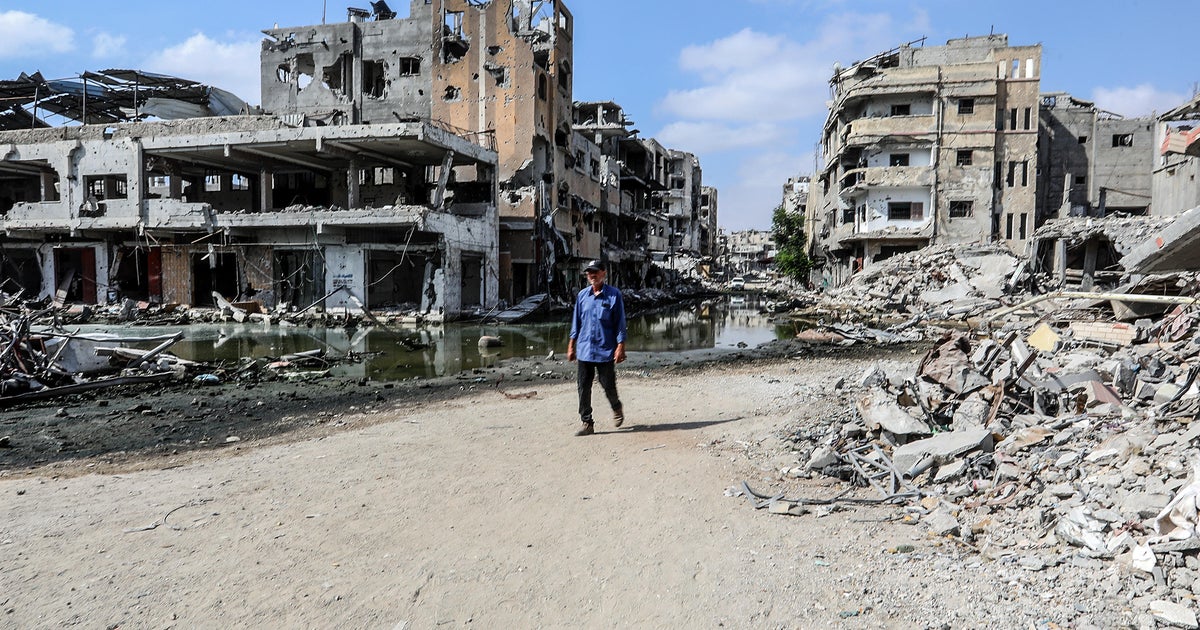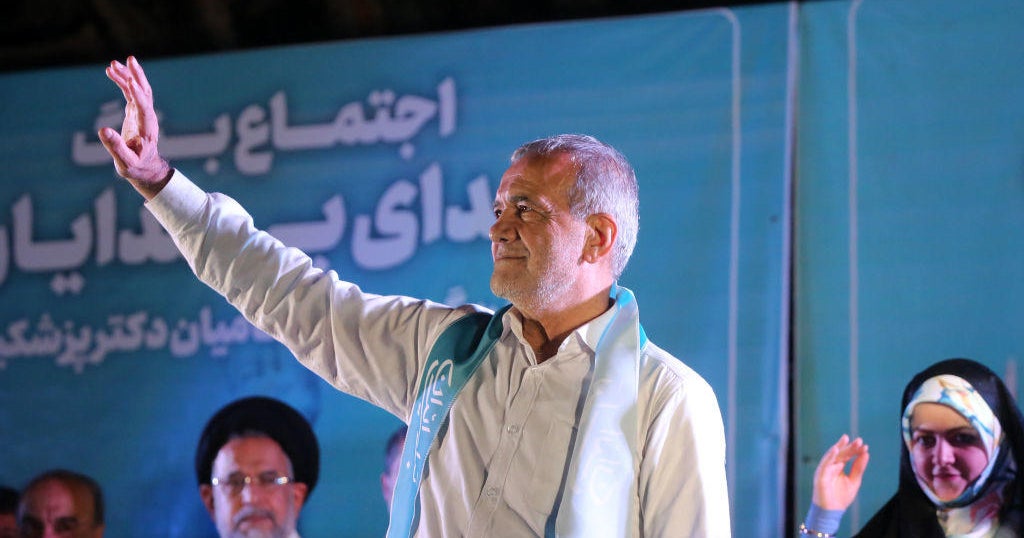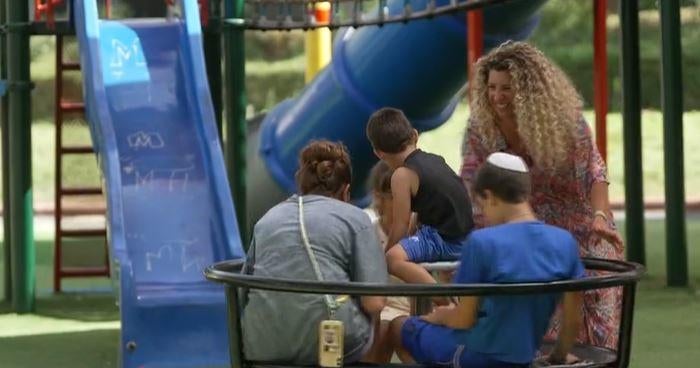CBS News
Palestinians ordered to flee Khan Younis, signaling likely new Israeli assault on southern Gaza city

The Israeli army ordered a mass evacuation of Palestinians from much of Khan Younis on Monday, a sign that troops are likely to launch a new ground assault in the Gaza Strip’s second largest city.
The order suggested Khan Younis will be the target in the latest of Israel’s repeated raids into parts of Gaza it had previously invaded during the past nearly nine months, pursuing Hamas militants as they regroup. Much of Khan Younis was already destroyed in a long assault earlier this year, but large numbers of Palestinians have since moved back in to escape another Israeli offensive in Gaza’s southern-most city, Rafah.
Monday’s evacuation call covered the entire eastern half of Khan Younis and a large swath of the Gaza Strip’s southeast corner. Earlier in the day, the army said a barrage of rockets out of Gaza was fired from Khan Younis.
The order suggested a new assault into the city was imminent. Israeli forces fought for weeks in Khan Younis earlier this year and withdrew, claiming to have destroyed Hamas battalions in the city. But in other places where the military made similar claims, renewed raids have underscored Hamas’ continued capabilities.
Thousands of Gazans had returned to Khan Younis in April after Israel’s withdrawal from the city. Malak, 13, was among those who returned, hoping to find any belongings that might have survived. She found nothing left.
“Everything is destroyed. There is no life here anymore,” she previously told CBS News. “Our dreams are gone and so is our childhood.”
Abed Rahim Khatib/Anadolu via Getty Images
An evacuation and eruption of fighting in the Khan Younis area could further hamper Palestinians’ access to much-needed potable water. Included in the evacuation zone is a water line that Israel installed following criticism over its cutoff of water to the strip early in its campaign.
Also in the zone is the area surrounding the Kerem Shalom crossing, the major aid crossing to southern Gaza, as well as an aid route that Israel said it would safeguard to allow trucks carrying humanitarian aid to enter the strip. Very little aid has entered the strip due to lawlessness along the aid route, and a new offensive would risk further harming aid efforts.
The United Nations Human Rights Office in Palestine responded to the new evacuation order in a Monday social media post.
“Extremely concerned that thousands from Khan Younis have been asked to evacuate, which will likely result in huge mass displacement, suffering, & family separation, all when the population is facing severe shortage of food, water, shelter & other basic necessities,” the agency said.
World Central Kitchen operates a field kitchen out of Khan Younis. Operations began there in late June. The kitchen was named Zomi’s Kitchen to honor one seven aid workers killed by Israeli air strikes in April.
The order came as Israel released the director of Gaza’s main hospital after holding him for seven months without charge or trial over allegations the facility had been used as a Hamas command center. He said he and other detainees were held under harsh conditions and tortured. There was no immediate response from the prison service, which has previously denied similar accusations.
The decision to release Mohammed Abu Selmia raised questions over Israel’s claims surrounding Shifa Hospital, which Israeli forces have raided twice since the start of the nearly nine-month war with Hamas. Abu Selmia and other Palestinian health officials have denied the accusations.
His release triggered an uproar across Israel’s political spectrum. Government ministers and opposition leaders expressed outrage and insisted Abu Salmia played a role in Hamas’ alleged use of the hospital — though Israeli security services rarely unilaterally free prisoners if they have a suspicion of militant links. Prime Minister Benjamin Netanyhu’s office called the release “a grave mistake.”
Israel launched its offensive after Hamas’ Oct. 7 attack, in which Palestinian militants killed some 1,200 people across southern Israel and took another 250 hostage. In its campaign, Israel has killed at least 37,900 Palestinians, according to Gaza’s Hamas-run Health Ministry, which does not distinguish between civilian and combatant deaths.
Most of Gaza’s population of 2.3 million have fled their homes, with many displaced multiple times. Israeli restrictions, ongoing fighting and the breakdown of public order have hindered the delivery of humanitarian aid, fueling widespread hunger and sparking fears of famine.
The U.S. military constructed a pier to bring aid into Gaza, but it was removed late last month due to weather. U.S. officials on Friday said the Pentagon is considering not re-installing the pier unless the aid begins flowing out into the population again.
Israeli Prime Minister Benjamin Netanyahu said Monday that the military was “making progress toward ending the phase of the destruction of Hamas’ terror army.” But he said forces will continue to “target their remains going forward.”
CBS News
As sunscreen misinformation spreads online, dermatologists face real-life impact of online trends

With the holiday weekend in full swing, the anti-sunscreen movement’s recent spike is worrying dermatologists.
“It was not like this before,” Dr. Jeanine Downie, a board-certified dermatologist with her own practice in New Jersey told CBS News Confirmed. “I see easily six patients per week that are anti-sunscreen, where it used to be maybe one every other week or one a month. And now it’s just gotten crazy.”
Downie says in the last two weeks she’s diagnosed three squamous cell and two malignant melanomas, both of which can turn cancerous if not caught early. “And that’s me, just one little dermatologist,” she said.
This movement picked up steam in June, with creators on TikTok telling followers in no uncertain terms “stop wearing sunscreen.” At first, the posts received tens of thousands of views and likes. Dermatologists on the platform then began sharing their own reactions, with those videos gaining even more views. And more recently, influencer Nara Smith went viral sharing an at-home sunscreen recipe to her 8 million followers that dermatologists say does little to protect wearers from sun damage.
Dr. Shereene Idriss, a New York dermatologist who has amassed more than a million followers on her social media channels, is trying to leverage that influence to educate users about sunscreen and sun protection.
“It’s becoming more and more difficult, I think, as a consumer, to try to weed through the noise,” Idriss told CBS News Confirmed.
This misinformation reflects the surprising reality of how some young Americans view sun safety. A study by the Orlando Health Cancer Institute in March found that 1 in 7 adults under the age of 35 say daily sunscreen use is more harmful than direct sun exposure. “I tell my patients, if you want your face to look like a leather bag later, then that’s up to you,” Downie said. About 6.1 million adults are treated each year for basal cell and squamous cell carcinomas according to the CDC. Skin cancer is the most common type of cancer in the country.
“They only want the natural things,” said Downie. “But I tell them all the time, sitting in traffic here in the tri-state area, the level of pollutants in the air on a daily, weekly and monthly basis is significantly more toxic than any chemical they’re going to rub into their skin with sunblock.”
While there’s no evidence that sunscreens are unsafe, the FDA is currently investigating potential concerns. It’s called for more data on 12 ingredients often found in U.S. sunscreen. After conducting its own study into how certain ingredients are absorbed into the bloodstream, the FDA has called for more research into potential health effects on the body.
However, beachgoers on the Jersey Shore this week told CBS News that sun safety is top of mind this summer. CBS News Confirmed looked at Google Search trends and saw terms like “sunscreen” and “what does skin cancer look like” are at an all-time high since tracking began in 2004.
“You know what gets them to start wearing sunblock?” said Downie. “Young kids and young adults, Gen Z, Gen X, they hate pores. And once they hear that they’re going to have big pores that look like potholes, they put that sunblock on.”
The dermatologists CBS Newsspoke with say there is no such thing as a healthy tan. To best protect yourself this summer, they say to use sunscreen and reapply often; wear UPF clothing or UV visors; and avoid being outside during peak UV index between 10 a.m. and 2 p.m.
CBS News
7/5: CBS Evening News – CBS News

Watch CBS News
Be the first to know
Get browser notifications for breaking news, live events, and exclusive reporting.
CBS News
Moderate Masoud Pezeshkian wins Iran’s presidential runoff election

Reformist candidate Masoud Pezeshkian won Iran’s runoff presidential election Saturday, besting hard-liner Saeed Jalili by promising to reach out to the West and ease enforcement on the country’s mandatory headscarf law after years of sanctions and protests squeezing the Islamic Republic.
Pezeshkian promised no radical changes to Iran’s Shiite theocracy in his campaign and long has held Supreme Leader Ayatollah Ali Khamenei as the final arbiter of all matters of state in the country. But even Pezeshkian’s modest aims will be challenged by an Iranian government still largely held by hard-liners, the ongoing Israel-Hamas war in the Gaza Strip, and Western fears over Tehran enriching uranium to near-weapons-grade levels.
A vote count offered by authorities put Pezeshkian as the winner with 16.3 million votes to Jalili’s 13.5 million in Friday’s election.
Fatemeh Bahrami/Anadolu via Getty Images
Supporters of Pezeshkian, a heart surgeon and longtime lawmaker, entered the streets of Tehran and other cities before dawn to celebrate as his lead grew over Jalili, a hard-line former nuclear negotiator.
But Pezeshkian’s win still sees Iran at a delicate moment, with tensions high in the Mideast over the Israel-Hamas war in the Gaza Strip, Iran’s advancing nuclear program, and a looming U.S. election that could put any chance of a detente between Tehran and Washington at risk.
The first round of voting June 28 saw the lowest turnout in the history of the Islamic Republic since the 1979 Islamic Revolution. Iranian officials have long pointed to turnout as a sign of support for the country’s Shiite theocracy, which has been under strain after years of sanctions crushing Iran’s economy, mass demonstrations and intense crackdowns on all dissent.
Government officials up to Supreme Leader Ayatollah Ali Khamenei predicted a higher participation rate as voting got underway, with state television airing images of modest lines at some polling centers across the country.
However, online videos purported to show some polls empty while a survey of several dozen sites in the capital, Tehran, saw light traffic amid a heavy security presence on the streets.
The election came amid heightened regional tensions. In April, Iran launched its first-ever direct attack on Israel over the war in Gaza, while militia groups that Tehran arms in the region — such as the Lebanese Hezbollah and Yemen’s Houthi rebels — are engaged in the fighting and have escalated their attacks.
Iran is also enriching uranium at near weapons-grade levels and maintains a stockpile large enough to build several nuclear weapons, should it choose to do so. And while Khamenei remains the final decision-maker on matters of state, whichever man ends up winning the presidency could bend the country’s foreign policy toward either confrontation or collaboration with the West.
The campaign also repeatedly touched on what would happen if former President Donald Trump, who unilaterally withdrew America from the Iran nuclear deal in 2018, won the November election. Iran has held indirect talks with President Joe Biden’s administration, though there’s been no clear movement back toward constraining Tehran’s nuclear program for the lifting of economic sanctions.
More than 61 million Iranians over the age of 18 were eligible to vote, with about 18 million of them between 18 and 30. Voting was to end at 6 p.m. but was extended until midnight to boost participation.
The late President Ebrahim Raisi, who died in a May helicopter crash, was seen as a protégé of Khamenei and a potential successor as supreme leader.
Still, many knew him for his involvement in the mass executions that Iran conducted in 1988, and for his role in the bloody crackdowns on dissent that followed protests over the 2022 death of Mahsa Amini, a young woman detained by police over allegedly improperly wearing the mandatory headscarf, or hijab.









